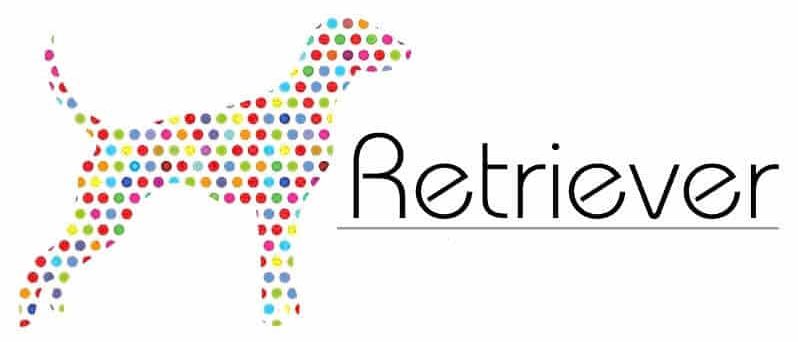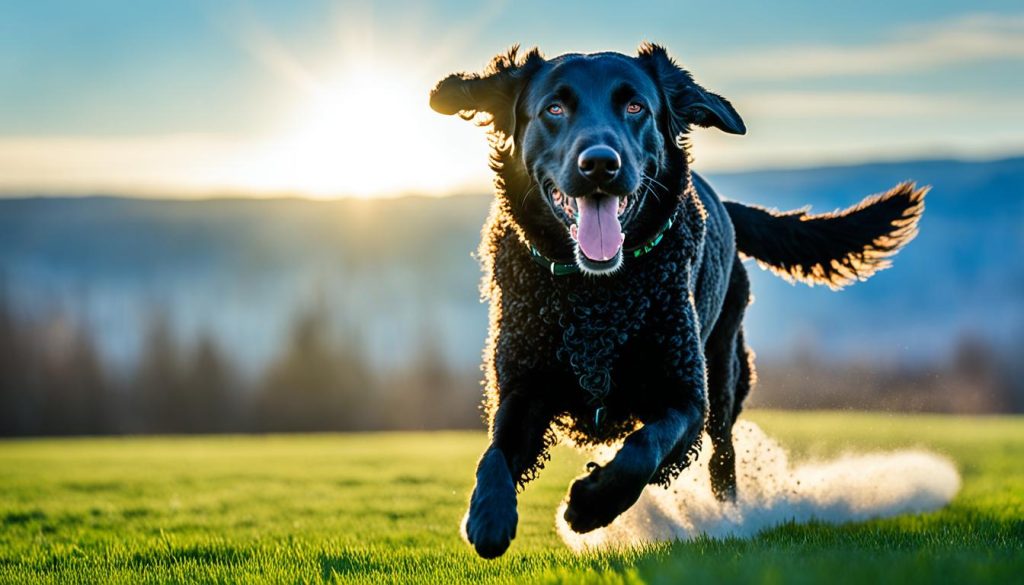The curly-coated retriever epitomises diverse and intelligent canine breeds. Celebrated for its distinctive water-resistant, curled coat and excellence in retrieval tasks, this breed transcends the role of merely a hunting ally to become an adored family member. This document details the essentials of caring for a breed with a rich heritage, showcasing unparalleled utility and companionship.
Addressing the care requirements of this unique retriever breed reveals that its needs surpass ordinary expectations. Attention to coat maintenance and a nutrient-rich diet is vital for fostering their intelligent dispositions and robust physiques. This guide serves to equip both established enthusiasts and potential owners with insights required to ensure a rewarding existence for their curly retrievers. Together, let us explore and celebrate the intricate qualities that render the curly-coated retriever a commendable addition to any home.
Key Takeaways
- Recognise the unique needs of the curly-coated retriever’s waterproof coat to prevent matting.
- Understand the importance of a balanced diet tailored to support an active and intelligent dog breed.
- Acknowledge the necessity of regular exercise and mental stimulation for the well-being of a retriever breed.
- Discover the amiable and adaptable temperament that marks the curly retriever as a superb family companion.
- Stay informed about breed-specific health concerns to ensure the enduring vitality of the curly-coated retriever.
Understanding the Curly-Coated Retriever Breed
The curly-coated retriever is distinguished by a unique appearance and versatile capabilities. It is renowned as an exceptional hunting dog with a remarkable heritage. An in-depth examination of their origins, physical attributes, and personality reveals a profound admiration for this breed. It thrives in outdoor settings and serves as a devoted family pet.
Origin and History of the Curly Retriever
Originating from Britain, the curly-coated retriever has a rich history as a favoured hunting companion. Their expertise in waterfowl retrieval and adaptability in various landscapes have earned them high esteem among hunting dog aficionados. As a result, they are acclaimed globally in the realm of game hunting.
Physical Characteristics: Recognising a Curly Coat Dog
Their tight, water-resistant curls are the most noticeable trait. This special coat offers protection from severe weather and augments their swimming prowess. These attributes underscore their historical role as adept waterfowl retrievers.
| Physical Trait | Description | Benefit |
|---|---|---|
| Coat Type | Water-resistant curls | Protection in wet conditions |
| Body Structure | Athletic and sturdy | Endurance in diverse terrains |
| Size | Medium to large | Strength for retrieving tasks |
Temperament of This Intelligent Dog Breed
The curly-coated retriever excels in waterfowl retrieval and fits well into family environments. Acknowledged for their intelligence and amiability, they perfectly embody a proficient hunting partner and a flexible household pet. It’s crucial for potential owners and enthusiasts to comprehend their temperament. This ensures a conducive and engaging living space.
Indeed, the curly-coated retriever represents an ideal combination of a curly coat dog. It boasts the intelligence and versatility essential for success in both hunting terrains and domestic settings.
The Essentials of Curly-Coated Retriever Care
The maintenance of a curly-coated retriever demands a comprehensive approach, focusing on their physical and psychological requirements. Their care is indispensable for their overall health. The breed’s coat is notably unique, with tight, dense curls that shield against weather but tend to mat. To prevent this, consistent grooming is pivotal. It should include thorough brushing and infrequent bathing to maintain the coat’s oils. Owners must regularly examine the coat for matting or foreign objects, especially after the dog has been outside.
Proper nutrition forms a crucial aspect of a curly retriever’s care. Given their sharp minds and active nature, they necessitate a diet that fuels their vitality and sustains their muscular physique. Choosing high-quality dog food designed for retrievers is key. Ideally, consulting a veterinarian to devise a feeding regimen that factors in the dog’s age, weight, and activity level is advisable. This strategy is essential for the welfare of the curly-coated retriever.
Furthermore, curly-coated retrievers, with their lively temperaments and keen intelligence, require consistent physical exercise and mental engagement. They flourish when challenged and participate in interactive activities. Engaging them in play such as fetch, agility drills, or scent work delivers both a physical and cognitive workout. Although typically hearty, these dogs may be prone to certain health issues. Being vigilant and responsive to any signs of health problems is critical for their longevity and well-being.
FAQ
What distinguishes the curly-coated retriever from other retriever breeds?
Among retriever breeds, the curly-coated retriever is notable for its unique, water-resistant, tightly curled coat, originally from Britain. This intelligent breed excels in hunting and waterfowling. Its friendly, adaptable nature makes it an excellent family companion as well.
How should one care for a curly-coated retriever’s unique coat?
Caring for the coat of a curly-coated retriever requires regular grooming. Brushing routinely is essential to prevent matting and maintain the coat’s curls. Bathing should be infrequent, preserving the natural oils that safeguard their coat’s characteristics.
What type of diet is recommended for a curly-coated retriever?
A balanced diet, rich in essential nutrients, supports the active lifestyle of a curly-coated retriever. Recommended is high-quality commercial food or a carefully planned homemade diet, catering to their needs. Continuous access to fresh water is imperative.
How much exercise does a curly retriever need?
Owing to their dynamic nature, curly-coated retrievers mandate regular exercise. Daily activities should span at least an hour, incorporating walks, fetch, or swimming. Their aquatic affinity, due to their waterfowl retrieving heritage, makes swimming a favoured activity.
Are curly-coated retrievers good with children and other pets?
Curly-coated retrievers generally exhibit a friendly disposition towards children and other pets, making them suitable for family integration. Nonetheless, ensuring their sociability involves early socialisation and consistent training.
What health issues are common in curly-coated retrievers?
This breed may exhibit a predisposition to specific hereditary ailments, including hip dysplasia, eye conditions, and some cancers. Proactive veterinary care and knowledge of these potential issues can facilitate early intervention and treatment strategies.
Do curly-coated retrievers make good hunting dogs?
Indeed, curly-coated retrievers excel as hunting companions. Their intellect, endurance, and innate retrieving instinct, particularly in aquatic settings, make them proficient. The protective nature of their curly coat further adapts them to diverse hunting landscapes.
How intelligent are curly-coated retrievers compared to other dogs?
Ranking high in terms of obedience and working intelligence, curly-coated retrievers are among the most astute breeds. Their quick learning ability, problem-solving skills, and training responsiveness underscore their versatility as working dogs and companions.
Can curly-coated retrievers live in apartments?
While capable of adapting to apartment life if exercise requirements are met, curly-coated retrievers ideally need more expansive environments. Residences with large yards provide the preferable space for these energetic dogs to play and exercise freely.
What is the life expectancy of a curly-coated retriever?
Curly-coated retrievers generally live between 9 to 14 years. Their longevity is enhanced through proper care, nutritional diet, consistent exercise, and regular veterinary attention.

